|
|
|
Sort Order |
|
|
|
Items / Page
|
|
|
|
|
|
|
| Srl | Item |
| 1 |
ID:
126477
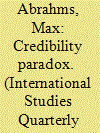

|
|
|
|
|
| Publication |
2013.
|
| Summary/Abstract |
Implicit in the rationalist literature on bargaining over the last half-century is the political utility of violence. Given our anarchical international system populated with egoistic actors, violence is thought to promote concessions by lending credibility to their threats. From the vantage of bargaining theory, then, empirical research on terrorism poses a puzzle. For nonstate actors, terrorism signals a credible threat in comparison with less extreme tactical alternatives. In recent years, however, a spate of studies across disciplines and methodologies has nonetheless found that neither escalating to terrorism nor with terrorism encourages government concessions. In fact, perpetrating terrorist acts reportedly lowers the likelihood of government compliance, particularly as the civilian casualties rise. The apparent tendency for this extreme form of violence to impede concessions challenges the external validity of bargaining theory, as traditionally understood. In this study, I propose and test an important psychological refinement to the standard rationalist narrative. Via an experiment on a national sample of adults, I find evidence of a newfound cognitive heuristic undermining the coercive logic of escalation enshrined in bargaining theory. Due to this oversight, mainstream bargaining theory overestimates the political utility of violence, particularly as an instrument of coercion.
|
|
|
|
|
|
|
|
|
|
|
|
|
|
|
|
| 2 |
ID:
090382
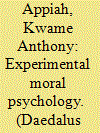

|
|
|
| 3 |
ID:
124395
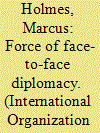

|
|
|
|
|
| Publication |
2013.
|
| Summary/Abstract |
Face-to-face diplomacy has long been the lynchpin of international politics, yet it has largely been dismissed as irrelevant in theories of cooperation and conflict-as "cheap talk" because leaders have incentives to dissemble. However, diplomats and leaders have argued for years that there is often no substitute for personally meeting a counterpart to hash out an agreement. This article argues that face-to-face diplomacy provides a signaling mechanism that increases the likelihood of cooperation. Face-to-face meetings allow individuals to transmit information and empathize with each other, thereby reducing uncertainty, even when they have strong incentives to distrust the other. The human brain has discrete architecture and processes devoted to parsing others' intentions via cues in face-to-face interaction. These processes enable actors to directly access the intentions of others with a higher degree of certainty than economic and game-theoretic models of bargaining predict.
|
|
|
|
|
|
|
|
|
|
|
|
|
|
|
|
| 4 |
ID:
099763
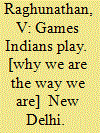

|
|
|
|
|
| Publication |
New Delhi, Penguin Books, 2006.
|
| Description |
xiv, 170 p.
|
| Standard Number |
9780670999408
|
|
|
|
|
|
|
|
|
|
|
|
Copies: C:1/I:0,R:0,Q:0
Circulation
| Accession# | Call# | Current Location | Status | Policy | Location |
| 055420 | 150/RAG 055420 | Main | On Shelf | General | |
|
|
|
|
| 5 |
ID:
128299
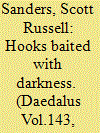

|
|
|
|
|
| Publication |
2014.
|
| Summary/Abstract |
I first read Walden when l was seventeen. the summer before starting college. at the urging of a high school teacher who sensed that my adolescent mind. brimming with questions, would bene?t from grappling with a truly radical thinker. Much of the book baf?ed me. The tone shifted unpredictably from conversational to prophetic, from jokey to stem, from earthy to mystical. I was bewildered by some of the lengthy sentences, which zigvagged among ideas and images. and l was stumped by the cryptic short ones. which seemed to compress whole paragraphs of meaning into a few words. Not yet having made any big decisions about how to lead my life, I couldn't ?gure out what was troubling this Henry David Thoreau. So what if his neighbors
thought he should use his Harvard degree to land a job and a wife, and then proceed to have kids, buy a
house. get rich. and distribute aims to the poor? Couldn't he just ignore the scolds and go his own way? Not yet having lost a loved one to accident. illness. or old age, I only dimly understood his brood- ing about that amoral process we call nature. So what if armies of red ants and black ants slaugh- tered one another, herons gobbled tadpoles, a dead horse stank up the woods, or a thousand seeds per- ished for each one that took root? What did all that mayhem and waste have to do with us, the owners of souls aiming at heaven ?
|
|
|
|
|
|
|
|
|
|
|
|
|
|
|
|
| 6 |
ID:
128294
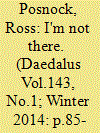

|
|
|
|
|
| Publication |
2014.
|
| Summary/Abstract |
Perhaps, like me. you have a propensity to collect books without quite knowing why. Over the years I have piled up books by and about, say, Ludwig Witt- genstein, Hannah Arendt, George Santayana, Philip Roth, Ad Reinhardt, Philip Guston, Franz Rosen- zweig, Penelope Fitzgerald, Thomas Bernhard - and not only not read them, but have no desire to do so. I have kept busy working on other things. And for a decade or two at a time. these texts simply gather dust on my shelves. But then, inevitably. I am drawn to these nearly forgotten volumes and. strangely, they prove pivotal to a new project: l recall. for instance, that Santayana ascended, literally, from the obscurity of a low shelf to earn a chapter in my book on William and Henry James. Wittgenstein made an analogous, if more circuitous, journey from the shadows, waiting untouched, until five years ago when I kept a long-held inner vow to read an- other languishing tome, one that had stared me down so often it had acquired an aura of intimidation: Stanley Cavell's The Claim of Reason: Wittgen-stein, Skeptirism, Morality and Tragedy. It was indeed intimidating. but also inspiring: that experience opened the door to more Cavell - and to deeper engagements with Emerson - and to Wittgenstein, who has joined the sage of Concord as a central ?gure in my current project on writers. artists. and philosophers who renounce their careers. The peculiarities of this manner of book buying - the absence of full consciousness and the long gap between acquisition and reading - puts me in mind
|
|
|
|
|
|
|
|
|
|
|
|
|
|
|
|
| 7 |
ID:
128183
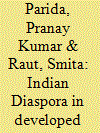

|
|
|
|
|
| Publication |
2014.
|
| Summary/Abstract |
The Indian Diaspora is a genetic term to describe the people who migrated from territories that are currently within the border of the Republic of India. It also refers to their descendants. The Diaspora is currently estimated to number over twenty million composed of NRI-Indian citizens not residing in India and PIO-persons of Indian Origin who have acquired the citizenship of some of other country. The Diaspora covers practically every part of the world.
|
|
|
|
|
|
|
|
|
|
|
|
|
|
|
|
| 8 |
ID:
128287
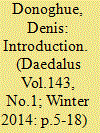

|
|
|
|
|
| Publication |
2014.
|
| Summary/Abstract |
It is a minor embarrassment that the words humanist and humanism are regularly found on the same page of big dictionaries. I should say at once, therefore, that the contributors to this issue of Dædalus are humanists because they work on the humanities and teach them, often under conditions that seem unpropitious, in colleges and universities. What they are otherwise, in their personal and social lives, is none of my business. Humanism raises a different issue. The Oxford English Dictionary gives ½ve meanings of it, in notably awkward phrasing. The predominant one refers to a tenet, an axiom, or a prejudice-depending on one's viewpoint-in the history of philosophy: A pragmatic system of thought introduced by F. C. S. Schiller and William James which emphasizes that man can only comprehend and investigate what is with the resources of the human mind, and discounts abstract theorizing; so, more generally, implying that technological advance must be guided by awareness of widely understood human needs. In some contexts, humanism has taken on
|
|
|
|
|
|
|
|
|
|
|
|
|
|
|
|
| 9 |
ID:
128295
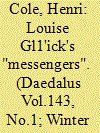

|
|
|
|
|
| Publication |
2014.
|
| Summary/Abstract |
You have only to wait, they will find you. The geese ?ying low over the marsh, glittering in black water. They find you. And the deer - how beautiful they are. as though their bodies did not impede them. Slowly they drift into the open through bronze panels of sunlight. Why would they stand so still if they were not waiting? Almost motionless, until their cages rust, the shrubs shiver in the wind. squat and lea?ess. You have only to let it happen: that cry - release, release - like the moon wrenched out of earth and rising full in its circle of arrows until they come before you like dead things. saddled with ?esh. and you above them. wounded and dominant.
|
|
|
|
|
|
|
|
|
|
|
|
|
|
|
|
| 10 |
ID:
128293
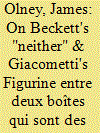

|
|
|
|
|
| Publication |
2014.
|
| Summary/Abstract |
I am very grateful to the editors of lkrdalm for per mitting and even encouraging me to select two works - Samuel Beckett's "neither" and Alberto Giacometti's sculpture Figurine entre deux boites qui
sont des maisons - for my discussion of influence. As I have been associated with literature departments throughout my career, I have chosen Beckett's for my primary text. But while I believe that what I want to say could be said from that work alone. I also believe that it will be more forceful, more convincing. and surely more graphic if I couple "neither" with Giacometti's Figurine. And as artists. Beckett and Giacometti had. in the ?nal analysis. so much in common that when we read. as a summary judgment of a whole body of work. that "he is one of the few artists who has contributed fundamentally to the way the human condition is perceived," no one unfamiliar with the statement could say with any assurance which artist is its subject.
|
|
|
|
|
|
|
|
|
|
|
|
|
|
|
|
| 11 |
ID:
128300
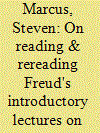

|
|
|
|
|
| Publication |
2014.
|
| Summary/Abstract |
I am going at least at first to write autobiographically. My justification for doing so is that I regard my experience as relatively typical and hence as bearing some fraction of non-negligible, if perhaps oblique, interest. I first read Freud sixty-?ve years ago. I was eighteen years old, and the occasion arose in what was then offered in my intellectually conservative college as a new course. The subject was in the humanities. and it consisted of works selected from some of the many masters of mid- nineteenth- and early-twentieth-century literature and thought. Included among them were such ?gures as Melville, Flaubert. Dostoevsky, Nietzsche. Henry and William James, George Bernard Shaw, I). H. Lawrence. Joyce, Proust, and Kafka. Inserted some- where in the second half of the chronological list was Freud's Introductory Lectures on Psychoanalysis, which he originally delivered between 1915 and 1917.' Hence the context in which Freud was pre- sented, and presented himself, to my largely bewildered late-adolescent sensibility was that of Western cultural, intellectual, and literary modernism. It was an advantage, I believe, to have read him for the first time among other immensely distinguished minds, writers who were in the course of radically departing from what had been generally accepted as canonical forms, conceptions, and conventions of representation - and of norms and values. including the values of civilization and of life itself.
|
|
|
|
|
|
|
|
|
|
|
|
|
|
|
|
| 12 |
ID:
128292
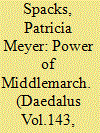

|
|
|
|
|
| Publication |
2014.
|
| Summary/Abstract |
Dorothea's eyes followed her husband anxiously. while he sank down wearily at the end of a sofa, and
resting his elbow supported his head and looked on the floor. A little flushed, and with bright eyes, she
seated herself beside him, and said "Forgive me for speaking so hastily to you this morning. I was wrong. I fear I hurt you and made the day more burdensome." "I am glad that you feel that, my dear," said Mr. Casaubon. He spoke quietly and bowed his head a little, but there was still an uneasy feeling in his eyes
as he looked at her. "But you do forgive me?" said Dorothea, with a quick sob. In her need for some manifestation of feeling she was ready to exaggerate her own fault. Would not love see returning penitence afar off , and fall on its neck and kiss it? "My dear Dorothea - 'who with repentance is not satis?ed. is not of heaven nor earth:'- you do not think me worthy to be banished by that severe sen- tence." said Mr. C asaubon. exerting himself to make a strong statement. and also to smile faintly. Dorothea was silent. but a tear which had come up with the sob would insist on falling. "You are excited, my dear. And I also am feeling some unpleasant consequences of too much mental disturbance." said Mr. Casaubon. In fact, he had it
in his thought to tell her that she ought not to have received young Ladislaw in his absence: but he abstained. partly from the sense that it would be un-gracious to bring a new complaint in the moment
|
|
|
|
|
|
|
|
|
|
|
|
|
|
|
|
| 13 |
ID:
044041
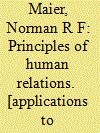

|
|
|
|
|
| Publication |
New York, John Wiley and Sons, 1952.
|
| Description |
ix, 474p.Hbk
|
|
|
|
|
|
|
|
|
|
|
|
Copies: C:1/I:0,R:0,Q:0
Circulation
| Accession# | Call# | Current Location | Status | Policy | Location |
| 000966 | 658.4036/MAI 000966 | Main | On Shelf | General | |
|
|
|
|
| 14 |
ID:
128873
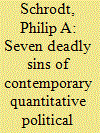

|
|
|
|
|
| Publication |
2014.
|
| Summary/Abstract |
A combination of technological change, methodological drift and a certain degree of intellectual sloth, particularly with respect to philosophy of science, has allowed contemporary quantitative political analysis to accumulate a series of dysfunctional habits that have rendered much of contemporary research more or less meaningless. I identify these 'seven deadly sins' as: Garbage can models that ignore the effects of collinearity; Pre-scientific explanation in the absence of prediction; Excessive reanalysis of a small number of datasets; Using complex methods without understanding the underlying assumptions; Interpreting frequentist statistics as if they were Bayesian; A linear statistical monoculture that fails to consider alternative structures; Confusing statistical controls and experimental controls. The answer to these problems is not to abandon quantitative approaches, but rather engage in solid, thoughtful, original work driven by an appreciation of both theory and data. The article closes with suggestions for changes in current practice that might serve to ameliorate some of these problems.
|
|
|
|
|
|
|
|
|
|
|
|
|
|
|
|
| 15 |
ID:
126577
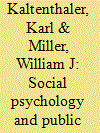

|
|
|
|
|
| Publication |
2013.
|
| Summary/Abstract |
This study argues that a central factor in the determinants of citizen attitudes toward trade is the social psychology of the individual in question. Namely, we contend that the level of social trust an individual has will condition the degree to which an individual wants to open her country to imports from other countries. Those individuals with lower relative levels of social trust are less likely to support the notion of freer trade. We base this contention on the logic that those people who are distrustful of people in general are more likely to distrust that which comes from people who are unknown to them, such as goods coming into their country from abroad. This argument is a departure from previous studies of public attitudes toward trade, which have focused on various economic utilitarian considerations and xenophobia that shape citizen attitudes toward trade liberalization. To test our argument, we employ data from the 1995-1997 wave of the World Values Survey. Using a logit regression analysis, we find, as predicted, that the more social trust an individual has, the more likely that person is to support the idea of liberalized trade.
|
|
|
|
|
|
|
|
|
|
|
|
|
|
|
|
| 16 |
ID:
128288
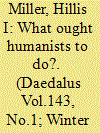

|
|
|
|
|
| Publication |
2014.
|
| Summary/Abstract |
I am honored to contribute to this issue of Dcedalus, "What Humanists Do."' Each contributor was asked by guest editor Denis Donoghue to identify a text that has meant much to her or him. then discuss it. This assignment presupposes that humanists spend much of their time interpreting texts and promoting their circulation among their students. readers of their scholarship, and the general public. It is as though we contributors were asked, "Come on now, account for your activities as humanists. Tell us what you do. Tell us why what humanists do contributes to the public good!" I promise further on to give such an accounting for my own work. First, however, I need to make a few preliminary remarks.
|
|
|
|
|
|
|
|
|
|
|
|
|
|
|
|
|
|
|
|
|